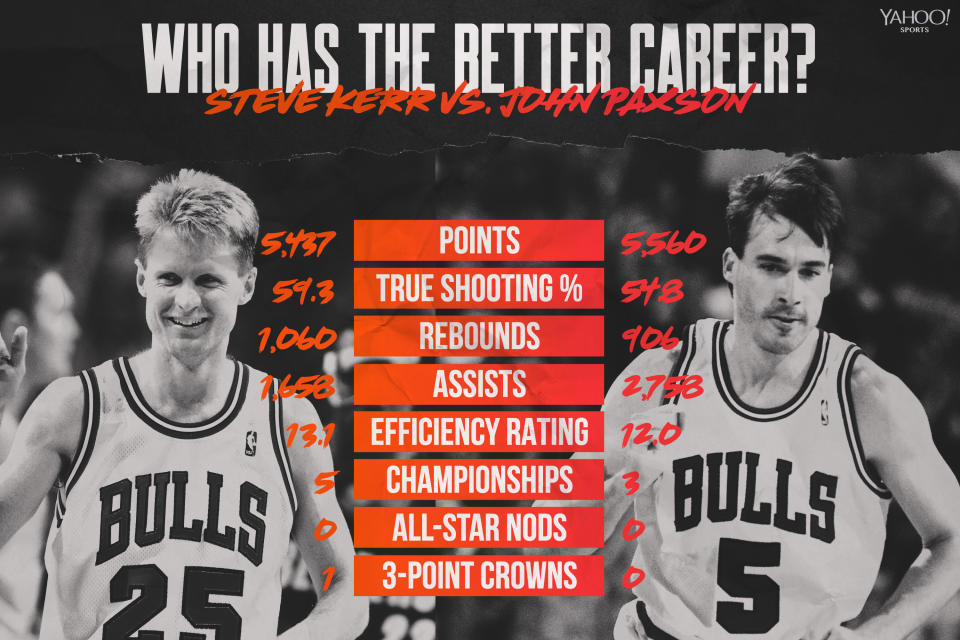Whose NBA career is better? Steve Kerr vs. John Paxson
Victors are determined decisively on the court, but one great joy of fandom outside the lines has no clear winner. We love to weigh the merits of our favorite players against each other, and yet a taproom full of basketball fans can never unanimously agree on the GOAT. In this series, we attempt to settle scores of NBA undercard debates — or at least give you fodder for your next “Who is better?” argument.
THE MATCHUP: Steve Kerr vs. John Paxson
Prime numbers
The Chicago Bulls traded the immortal Kyle Macy in 1986 to carve out a bigger role for a 26-year-old Paxson, and he responded with a six-year run as Michael Jordan’s primary backcourt partner before conceding his starting spot to B.J. Armstrong in Chicago’s third consecutive title campaign.
From 1986-92, Paxson averaged 8.3 points (on 50/36/81 shooting splits), four assists, 1.3 rebounds and 0.7 steals in 25.3 minutes a night. He missed just 15 games, starting 360 of his 559 on that run.
Jordan’s Bulls made the playoffs in each of those six seasons, winning championships in the final two with Paxson as a starter. Playing 81 of Chicago’s 83 playoff games from 1986-92, Paxson averaged 6.9 points (48/32/93 splits), 2.9 assists, one rebound and 0.6 steals in 24.5 minutes.
Paxson still averaged 17 minutes a night on Chicago’s third straight title run, but his production dipped considerably due to age and injury. Knee surgery cost him all but 27 games in the 1993-94 season, when he conceded his reserve role to Kerr, and Paxson retired at age 34 at season’s end.

As a 24-year-old playing on his second team in as many NBA seasons, Kerr led the league shooting 50.7 percent on 1.8 3-point attempts per game for the Cleveland Cavaliers in 1989-90. By 1992, he was averaging fewer than 10 minutes and worth a late second-round pick to the Orlando Magic.
It was not until joining the three-time defending champion Chicago Bulls that he enjoyed consistent success, and that carried through to their next three-peat. From 1993-98, Kerr averaged 8.2 points (51/48/85 splits), 2.2 assists, 1.5 rebounds and 0.7 steals in 23.2 minutes per game off the bench, playing 393 straight until injuries cost him 32 games in his final season with Chicago. He twice received Sixth Man of the Year votes (1994 and 1996) and led the league in 3-point shooting again during the 1994-95 campaign, converting 52.4 percent of his 170 attempts on the season.
During those five seasons, Kerr never missed a playoff game, averaging 5.2 points (43/39/88 splits), 1.4 assists, 0.9 rebounds and 0.6 steals in 19.1 minutes a game off the bench. The Bulls made the playoffs each year, winning three titles in Michael Jordan’s three full seasons as Kerr’s teammate.
By his Bulls end, Kerr was worth a first-round pick and an aging Chuck Person to the San Antonio Spurs. He won a fourth straight title in 1999, but his days as a playoff rotation regular were done.
When all was said and done, Paxson played a more integral part in the rise of the Bulls’ dynasty than Kerr did in seeing it through. Kerr was undoubtedly the superior marksman, but Paxson was a tertiary playmaker and starter for a Chicago team that pushed the Bad Boy Detroit Pistons to seven games in the 1990 Eastern Conference finals before breaking through for the first two of six titles.
Advantage: Paxson
Career high
Paxson’s peak came during the 1986-87 season, when he averaged career highs of 11.3 points (49/37/81 splits), 5.7 assists and 1.7 rebounds in 32.8 minutes per game, mostly as a starter. He averaged double-digit scoring just once more (1989-90) and never more than four assists again.
At his apex, Paxson led the Bulls in assists and finished third in scoring behind Jordan and Charles Oakley on a team that won 40 games and got swept in the first round by the Boston Celtics. Paxson averaged 8.7 points (50/43/100 splits) and 3.7 assists in 29 minutes over the three playoff games.
Pick any of Kerr’s seasons from 1993-97 as his pinnacle. He played all 82 games each year and shot no worse than 42 percent from distance. But it is hard to argue against the 1995-96 campaign as Kerr’s peak. While he fell short of field-goal and free-throw requirements to qualify among the league’s leaders, he created the 50/50/90 club playing 23.4 minutes per game for a 72-win team.
During that season, Kerr averaged 8.4 points (51/52/93 splits), 2.3 assists and 1.3 rebounds a night. He was fifth on the record-setting Bulls in scoring and sixth in assists. His 122 3-pointers were second only to Scottie Pippen and more than twice as many as Paxson ever made in any season.
Kerr averaged playoff career highs of 6.8 points (45/32/87 splits) and 1.7 assists in 19.8 minutes over 18 games in 1996, winning the first of his three titles as the third guard on Jordan’s Bulls.
Again, while Kerr walked away with a championship at the end of his best season, Paxson was more productive and essential in three separate years, including Chicago’s first title run in 1991.
Advantage: Paxson
Clutch gene
This is why you came here. Both Kerr and Paxson made one of the most memorable shots in NBA Finals history, respectively delivering Jordan’s third and fifth rings with series-winning jump shots.
Paxson made his in 1993, taking the kick-out from Horace Grant and sinking a wide-open triple with 3.9 seconds left in Game 6 of the Finals to secure a 99-98 victory and clinch a third straight title.
Kerr’s came in 1997, when Jordan drew the defense and found a wide-open Kerr, who stepped into a mid-range jumper that broke a 96-96 tie with five seconds left in Game 6 of the Finals. Pippen then stole the ensuing inbound pass and assisted a streaking Toni Kukoc to put a fifth title on ice.
Paxson was a no-show in four advance-or-go-home games in the prime of his career. He combined for five points on nine shots over 31 minutes in both a Game 5 win over Cleveland in the first round of the 1988 playoffs and a Game 7 victory against the Knicks in the 1992 Eastern Conference semifinals. And Paxson missed both Game 5 of Chicago’s 1989 first-round series against the Cavs, when Jordan hit “The Shot,” and Game 7 of the 1990 Eastern Conference finals loss to the Pistons.
Although, in addition to his 1993 series-winner, Paxson came up huge down the stretch in the close-out Game 5 against the Los Angeles Lakers in the 1991 Finals, totaling 20 points on 12 shots.
Kerr played two advance-or-go-home games in his prime to mix results. He finished scoreless on two shots in the Game 7 loss to the New York Knicks in the 1994 Eastern Conference semifinals, and he scored 11 huge points in the Game 7 victory against the Indiana Pacers in the 1998 Eastern Conference finals, including the game-tying 3-pointer midway through the fourth quarter.
In addition to his 1997 series-winner, Kerr enjoyed a few more clutch moments in big games at every stage of his career. His halfcourt heave at the end of the third quarter in Game 1 of the 1992 Eastern Conference semifinals propelled his Cavaliers to victory in a series they went on to win in seven games. His last-minute rebound and assist to Jordan and a pair of clutch free throws helped steal Game 2 of the 1998 Finals in Utah. And at age 37 his unlikely 4-for-4 3-point shooting effort for the Spurs in Game 6 of the 2003 Western Conference finals sent San Antonio to the Finals.
Advantage: Kerr
Hardware
• Kerr: Five-time NBA champion; 1997 3-point contest champion
• Paxson: Three-time NBA champion
Raise your hand if you would rather have five rings than three. It’s just math.
Advantage: Kerr
For the culture
Paxson is the the younger brother of a two-time All-Star, but his role in Jordan’s rise to superstardom and Chicago’s first three championships vaulted him to greater notoriety.
He leveraged that success into roles as an assistant coach on the 72-win Bulls in 1995-96 and a color commentator on the team’s radio broadcasts until 2003, when he was named general manager. He was subsequently promoted to vice president of basketball operations in 2009.
Along with Gar Forman, Paxson rebuilt the Bulls into a title contender in the early 2010s before injuries ravaged a roster of standout lottery picks. Ever since, the two were the subject of multiple “Fire GarPax” campaigns. Paxson survived the team’s recent front-office overhaul, although he was demoted to senior adviser of basketball operations with the recent hiring of Arturas Karnisovas. There is little doubt Paxson’s run as an executive has taken some of the sheen off his Bulls legacy.
Meanwhile, Kerr famously exchanged punches with Jordan and mocked him during the 1997 championship parade. He is one of 26 players with five rings and the only one since Bill Russell’s Celtics to win four straight. His 45.4 career 3-point percentage is the highest in NBA history.
He can now lord it all over two-time MVP Stephen Curry as the head coach of the Golden State Warriors, a team Kerr has steered to three championships in five straight Finals appearances. Kerr’s .709 winning percentage is the highest of any coach with more than two years of experience.
In between, he reconstructed a Phoenix Suns team that reached the 2010 Western Conference finals and established himself as a high-level commentator, writing for both Yahoo Sports and Grantland in addition to calling NBA and NCAA tournament games for Turner Sports and CBS.
All to say nothing of Kerr’s headline-grabbing political commentary and staunch support of gun control legislation as the son of Malcolm Kerr, the American University of Beirut president who was assassinated by members of the Shia Lebanese militia in 1984, when Steve was 18 years old.
Few, if any, players of Kerr’s caliber have made so great an NBA name for themselves.
Advantage: Kerr
THE DAGGER: Steve Kerr had the better career.
Previously on “Whose NBA career is better?”:
• Dwyane Wade vs. Dirk Nowitzki
• Carmelo Anthony vs. Vince Carter
• Kobe Bryant vs. Tim Duncan
• Chris Paul vs. Isiah Thomas
• Pau Gasol vs. Manu Ginobili
• Patrick Ewing vs. David Robinson
• Shaquille O’Neal vs. Hakeem Olajuwon
• Larry Bird vs. Magic Johnson
• Wilt Chamberlain vs. Bill Russell
• Jason Kidd vs. Steve Nash
• Ray Allen vs. Reggie Miller
• Charles Barkley vs. Karl Malone
• Grant Hill vs. Tracy McGrady
• Dwight Howard vs. Rajon Rondo
• Gary Payton vs. John Stockton
• Kevin Garnett vs. Moses Malone
• Kevin McHale vs. James Worthy
• Walt Frazier vs. Scottie Pippen
• Horace Grant vs. Draymond Green
If you have an idea for a matchup you would like to see in this series, let us know.
– – – – – – –
Ben Rohrbach is a staff writer for Yahoo Sports. Have a tip? Email him at rohrbach_ben@yahoo.com or follow him on Twitter! Follow @brohrbach
More from Yahoo Sports:


